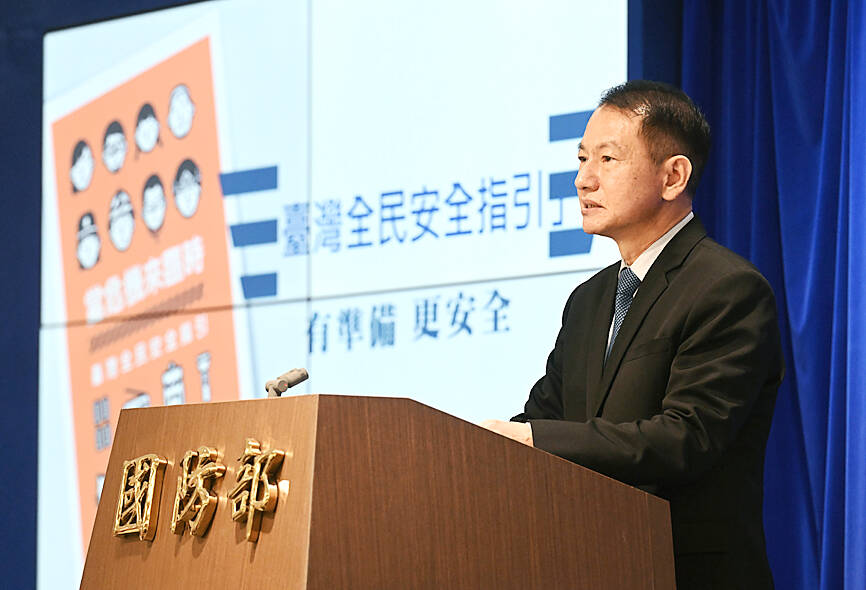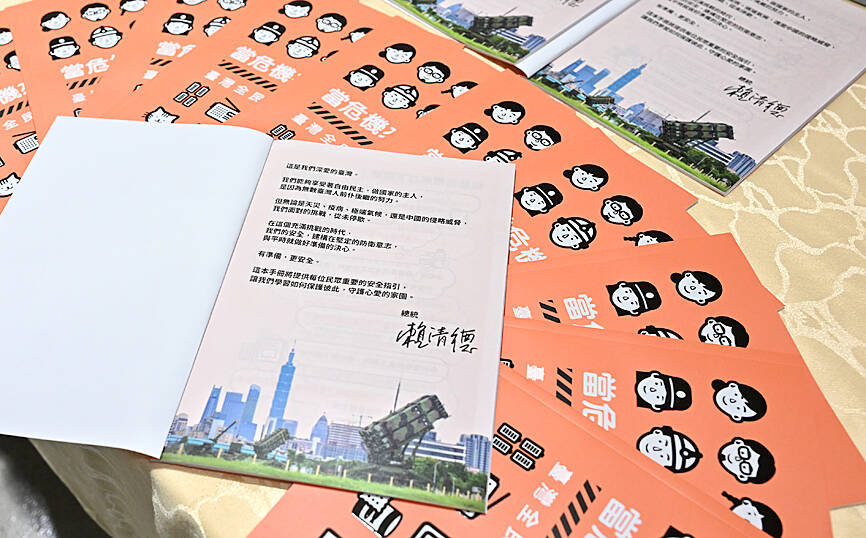The latest edition of the National Public Safety Guide is being mailed to all citizens starting today to foster public awareness of self-defense in the event of war or natural disasters, the Ministry of National Defense said yesterday.
“The guides will be disseminated to the public to enhance society’s overall understanding of threats and bolster defense awareness, demonstrating the government’s emphasis on people’s safety and its determination to pursue self-defense,” All-out Defense Mobilization Agency Director Shen Wei-chih (沈威志) said at the ministry’s news conference.
The nationwide distribution campaign was planned according to President Lai William’s (賴清德) Sept. 20 directive, he said, adding that the goal is to deliver all handbooks to Taiwan’s 9.83 million registered households by Jan. 5.

Photo: Lin Cheng-kun, Taipei Times
Copies will also be distributed at public welfare events, disaster prevention drills and national defense education courses, he said.
Starting on Dec. 19, an additional 105,000 printed copies in English are to be delivered to embassies and representative offices, said Chao Shih-hsuan (趙世絢), a deputy counselor at the Ministry of Foreign Affairs.
The handbook’s publication cost NT$42.79 million (US$1.37 million), or an average of NT$3.8 per booklet, with the funds coming from the government’s Secondary Reserve Fund, Shen said, adding that distribution costs are expected to reach NT$20 million.

Photo: Lin Cheng-kun, Taipei Times
The government’s effort to bolster public security consciousness and social resilience aligns with policies adopted by other democracies worldwide, such as the Czech Republic, Sweden, Finland and Lithuania, he said.
The increasing frequency of extreme weather events and natural disasters, and severe risks posed by authoritarian governments in international affairs highlighted the need for the booklet’s general distribution, Shen said.
Asked whether Taiwan’s more than 800,000 migrant workers are included in the distribution, Chao said: “We will have to coordinate with the relevant authorities to explore additional distribution channels beyond embassies and representative offices in Taiwan.”
In addition to hard copies, Chinese and English-language electronic versions can be downloaded from the All-Out Defense Mobilization Agency’s Web site.
The agency has released three editions of the handbook since 2022. The guide covers information ranging from go-bag preparation to survival tips during natural disasters and wartime emergencies.
National Security Council Deputy Secretary-General Lin Fei-fan (林飛帆) has noted that the booklet clearly states that: “Under the threat of war, Taiwan will never surrender.”
The new version has been compiled referencing similar documents in circulation in northern Europe, including what necessities must be prepared, reactive measures in different scenarios and what to do in time of war, he said.
The handbook states that any information about the government surrendering or the nation having failed is fake news and the public must cleave to this belief to prevent possible confusion caused by disinformation perpetrated by the enemy, Lin said.

NATIONAL SECURITY THREAT: An official said that Guan Guan’s comments had gone beyond the threshold of free speech, as she advocated for the destruction of the ROC China-born media influencer Guan Guan’s (關關) residency permit has been revoked for repeatedly posting pro-China content that threatens national security, the National Immigration Agency said yesterday. Guan Guan has said many controversial things in her videos posted to Douyin (抖音), including “the red flag will soon be painted all over Taiwan” and “Taiwan is an inseparable part of China,” while expressing hope for expedited “reunification.” The agency received multiple reports alleging that Guan Guan had advocated for armed reunification last year. After investigating, the agency last month issued a notice requiring her to appear and account for her actions. Guan Guan appeared as required,

Japan and the Philippines yesterday signed a defense pact that would allow the tax-free provision of ammunition, fuel, food and other necessities when their forces stage joint training to boost deterrence against China’s growing aggression in the region and to bolster their preparation for natural disasters. Japan has faced increasing political, trade and security tensions with China, which was angered by Japanese Prime Minister Sanae Takaichi’s remark that a Chinese attack on Taiwan would be a survival-threatening situation for Japan, triggering a military response. Japan and the Philippines have also had separate territorial conflicts with Beijing in the East and South China

A strong cold air mass is expected to arrive tonight, bringing a change in weather and a drop in temperature, the Central Weather Administration (CWA) said. The coldest time would be early on Thursday morning, with temperatures in some areas dipping as low as 8°C, it said. Daytime highs yesterday were 22°C to 24°C in northern and eastern Taiwan, and about 25°C to 28°C in the central and southern regions, it said. However, nighttime lows would dip to about 15°C to 16°C in central and northern Taiwan as well as the northeast, and 17°C to 19°C elsewhere, it said. Tropical Storm Nokaen, currently

PAPERS, PLEASE: The gang exploited the high value of the passports, selling them at inflated prices to Chinese buyers, who would treat them as ‘invisibility cloaks’ The Yilan District Court has handed four members of a syndicate prison terms ranging from one year and two months to two years and two months for their involvement in a scheme to purchase Taiwanese passports and resell them abroad at a massive markup. A Chinese human smuggling syndicate purchased Taiwanese passports through local criminal networks, exploiting the passports’ visa-free travel privileges to turn a profit of more than 20 times the original price, the court said. Such criminal organizations enable people to impersonate Taiwanese when entering and exiting Taiwan and other countries, undermining social order and the credibility of the nation’s